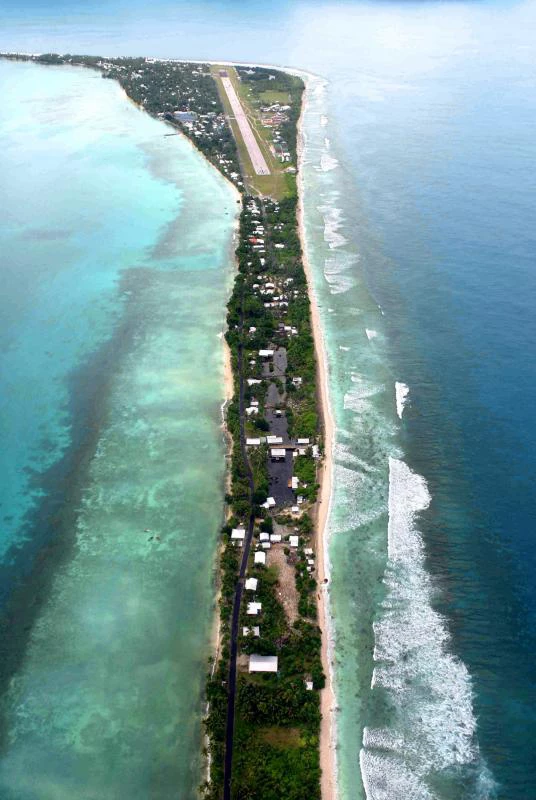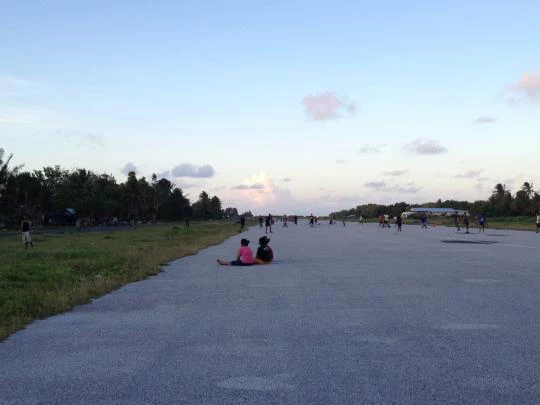
Funafuti International Airport near
top of photo.
Like other Pacific Island Countries (PICs), Tuvalu relies on a very limited range of revenues — natural resource rents, tourism, remittances, aid and the lease of its highly fortuitous .tv Internet Top Level Domain. All of these are external, and each one is dependent to a greater or lesser degree on connectivity and access. Connectivity is also important in the context of disasters, as evidenced in March 2015 when Cyclone Pam caused widespread damage to the central and northern islands.
Many PICs suffer from inadequate airport and freight handling facilities. Due to their small population bases, these countries lack the proper policy, regulatory environments and infrastructure to comply with International Civil Aviation Organization requirements. This results in challenges in ensuring safe and secure operations, with international airline operators servicing the PIC markets incurring considerable risks consequently driving up air fares.
Since 2011, the World Bank's regional Pacific Islands Aviation Investment Program (PAIP) has implemented a series of projects totaling approximately US$97 million. The Governments of Tuvalu, Kiribati, Samoa and Tonga — as well as the Pacific Aviation Safety Office, a regional regulatory oversight authority — are getting help build their respective infrastructure and regulatory capacity. Participating countries are receiving support for:
- Infrastructure investments;
- Aviation sector reform; and
- Strengthening the operations and management of regional airports.

Funafuti airport, the community often
uses the space for sports and socializing.
One of the key investments for aviation safety and security is the provision of an airport fence. However, Tuvalu’s lack of land presented a unique challenge to the project.
The World Bank’s safeguard policies aim to prevent and mitigate the negative environmental and social aspects of our projects. When working with the government designing the Tuvalu Aviation Investment Project the team had an issue with the proposal to build a fence around Funafuti runway.
There is a serious problem with dogs on the runway endangering aircraft so, ideally, we should put a fence around the runway. However, this is the only large open area on the island and people use the airport grounds for recreational activities such as soccer, volleyball and bicycle riding.
The Funafuti airport is not the only airport in the world without a fence, but it probably is the only one where the runway plays such a critical role for the community. After all, it is the largest open space in the country so where better to socialize and play sports?
It was clear that while for technical reasons a fence was important, the negative impact of a fence from a social point of view was too great, so a fence was not included in the project design. The Bank has worked with the government to put in place other measures to mitigate the risk of not having the fence and control dogs.
As Task Team Leader and Lead Transport Specialist, I was interviewed alongside Knut Opsal, Lead Social Development Specialist, for the video below. We were interviewed by a Dutch team who were in Fongafale Island doing a documentary on football — two Tuvaluan players are in Holland. The following video shows the challenges of the task team's experience on the ground:
Runway on Fongafale Island, Tuvalu


Join the Conversation